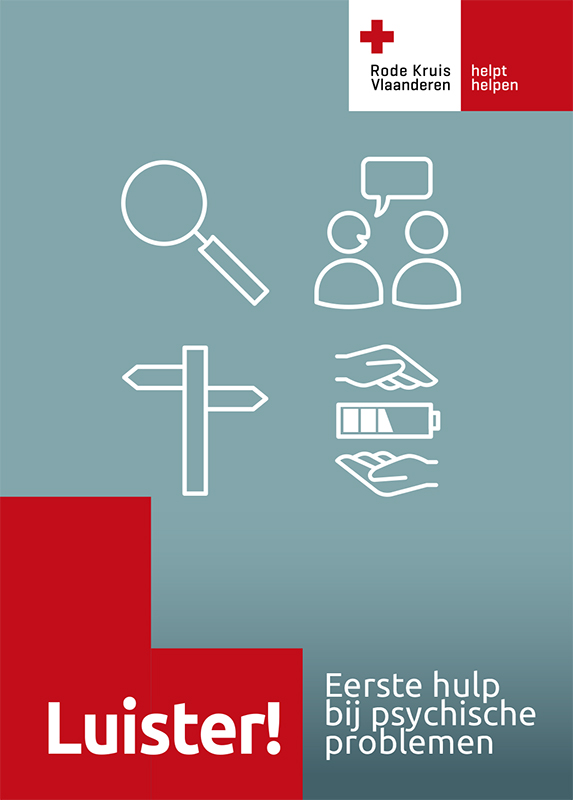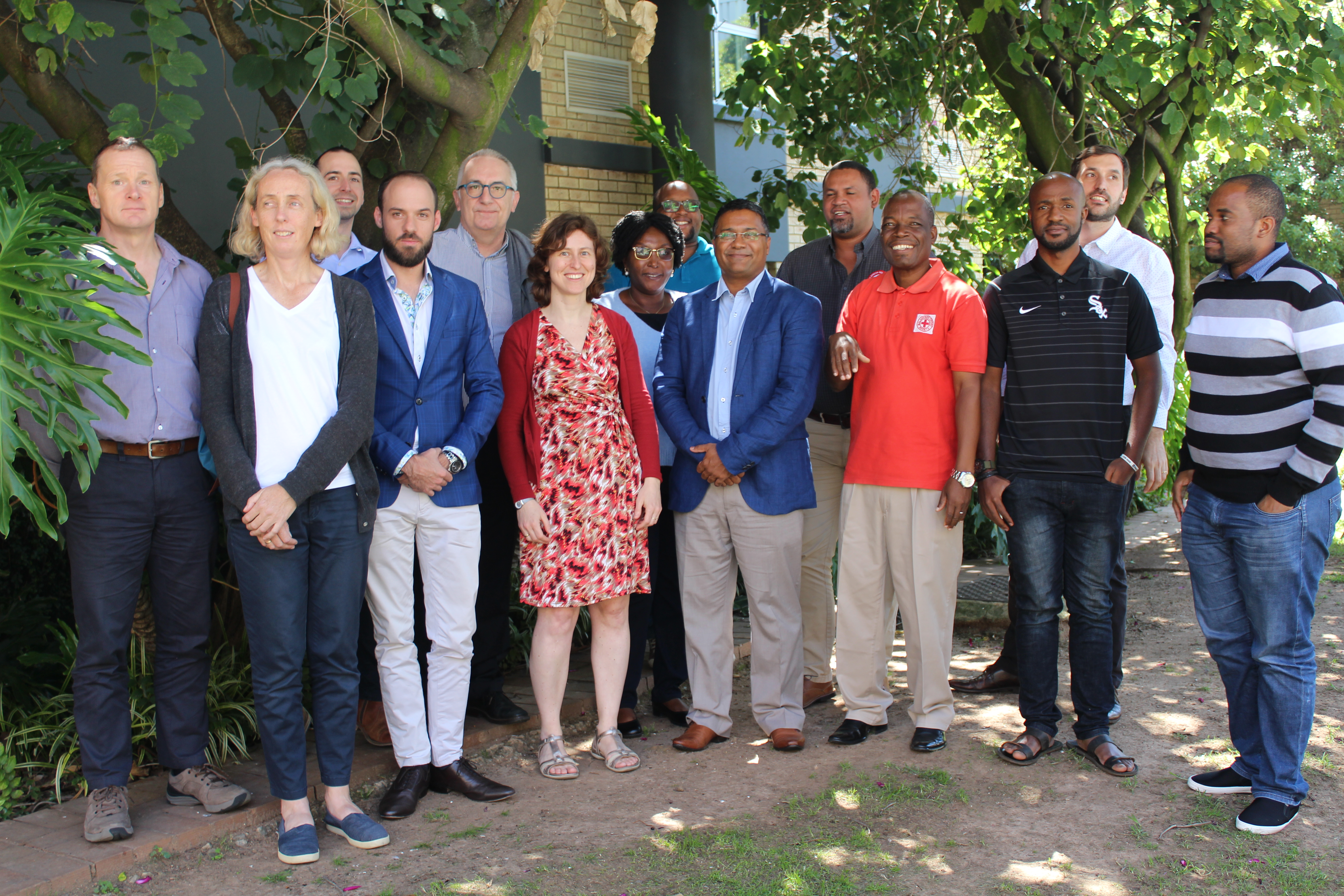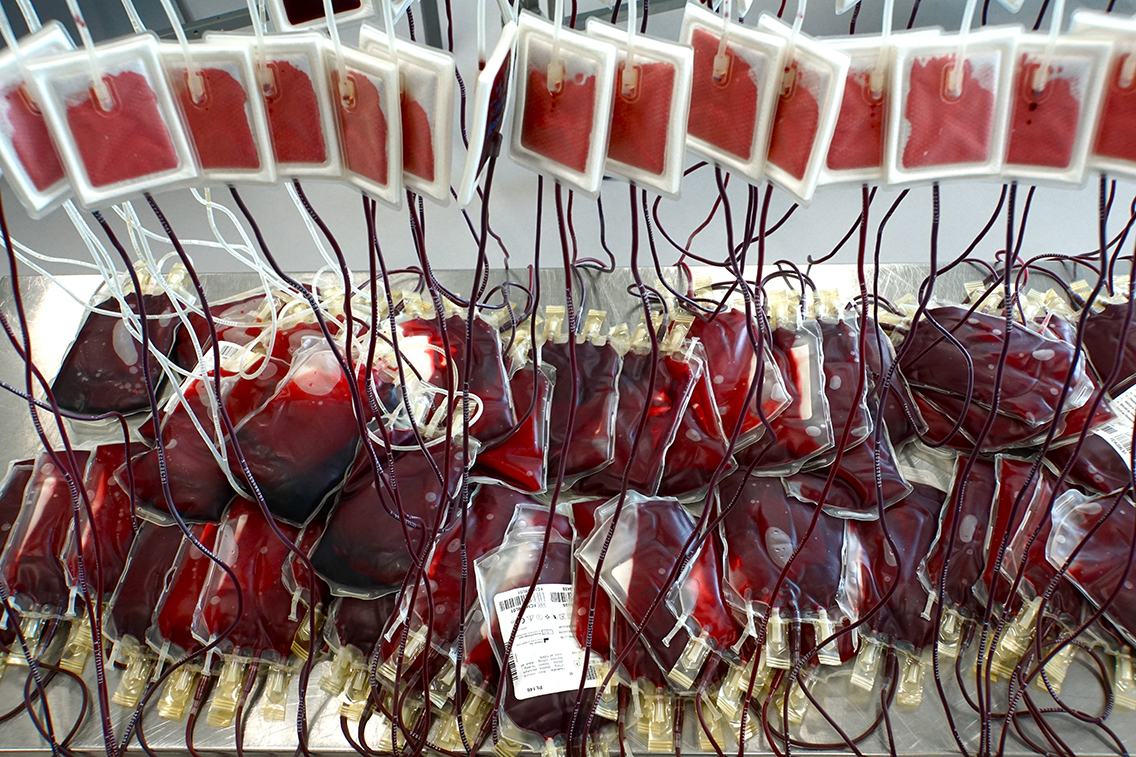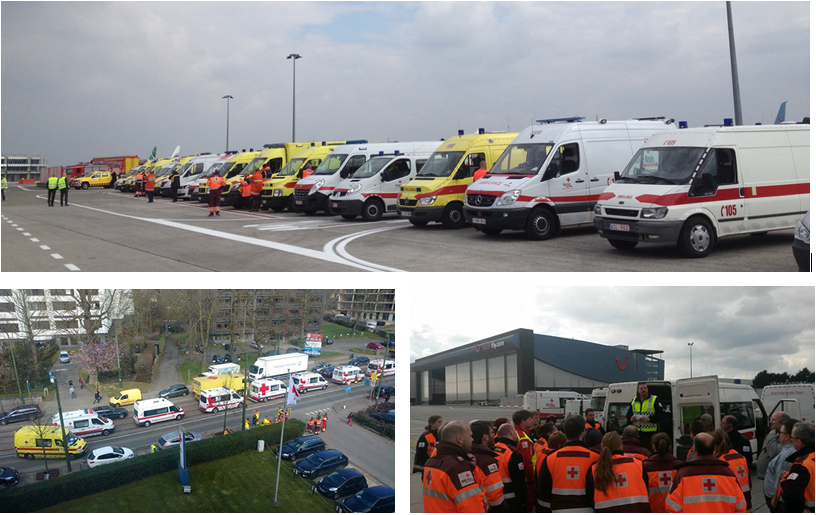2019
First aid
First aid for mental health problems (guideline and manual)
 In collaboration with various partners within the mental health context (*), CEBaP developed an evidence-based guideline and training manual for first aid in case of mental health problems (including among others addiction, burnout, depression, grief,…), adapted to the Flemish context. The project started in March 2018 and the manual was published in August 2019 and is now available in the webshop of the Belgian Red Cross (manual in Dutch). The guideline and training manual were pilot tested in September-November 2019 and will be implemented by the Belgian Red Cross starting from May 2020. More information about the training is available on the Red Cross web page.
In collaboration with various partners within the mental health context (*), CEBaP developed an evidence-based guideline and training manual for first aid in case of mental health problems (including among others addiction, burnout, depression, grief,…), adapted to the Flemish context. The project started in March 2018 and the manual was published in August 2019 and is now available in the webshop of the Belgian Red Cross (manual in Dutch). The guideline and training manual were pilot tested in September-November 2019 and will be implemented by the Belgian Red Cross starting from May 2020. More information about the training is available on the Red Cross web page.
In developing the guidelines, we built on CEBaP’s principles of Evidence-Based Practice, combining scientific evidence with the interests of the target group and expert opinion. After the needs and interests of the target group were explored, we performed a systematic literature review, starting from one general question: “In people experiencing mental health problems, are different forms of communication by laypeople effective as compared to no communication, to improve mental health?” We identified 30,099 records, screened 1,454 full texts, and finally selected 95 primary research articles for data extraction. We summarized the available evidence in 66 evidence conclusions, which were the base for the first draft of the training manual. Each chapter of this first draft was critically evaluated by an expert panel, consisting of 10 professional experts (psychiatrists and psychologists from academia and the field of mental health relief) and 6 patient representatives (mental health peer workers). Their contribution led to 33 unique recommendations being formulated on how to apply first aid communication strategies to help people experiencing mental health problems. These recommendations were either evidence-based or considered Good Practice Points when little or no evidence was available.
This project nicely demonstrates how both scientific evidence and practical expertise are essential to result in an evidence-based and useful first aid guideline. Two scientific papers about the methodology and results of this project were submitted for publication and will soon be available in our Publications list.
*Of note: The steering board for this project consists of (leading partner) Zorgnet-Icuro, de Vlaamse Overheid (Vlaams Agentschap Zorg en Gezondheid), Steunpunt Geestelijke Gezondheid, VLESP (Vlaams Expertisecentrum Suïcidepreventie), Vlaams Instituut Gezond Leven, Vlaamse Kenniscentrum Eetexpert, VAD (Vlaams expertisecentrum voor alcohol, illegale drugs, psycho-actieve medicatie, gokken en gamen), Centrum voor Volwassen Onderwijs – Sociale School Heverlee, het Vlaams Patiëntenplatform/ OPGanG, Similes and Belgian Red Cross Flanders.
First Aid for First Responders (guideline and manual)
CEBaP contributed to the development of the first evidence-based first aid guideline for first responders in Africa. First responders are laypeople who are trained in advanced first aid techniques and are the first line of response within a community when disaster strikes. The lack of effective emergency services in many countries in Sub-Saharan Africa means that these people are crucial in disaster response systems in this region.
CEBaP produced a total of 87 evidence summaries to substantiate this manual. In March, a face-to-face meeting was held in Johannesburg, South-Africa, with 13 African experts in first aid training and emergency medicine to discuss the scientific evidence and form recommendations for practice. The manual is currently being tested during first responder trainings in Malawi and is scheduled for launch in 2020 in Malawi, South-Africa and Zimbabwe. Moreover, the manual will soon be freely available online, and the scientific publication describing the project will be available soon.

Systematic reviews on first aid topics
First aid systematic reviews in collaboration with ILCOR
Already since 2013 CEBaP is a member of the First Aid Task Force of ILCOR, conducting systematic reviews to address relevant first aid questions. In 2019 CEBaP conducted a systematic review on how to administer glucose in case of a hypoglycemia. This review was a first pilot project for the collaboration between ILCOR and Cochrane, and was published in the Cochrane Library in April 2019. The review identified 4 studies, and showed that oral intake of glucose is preferred above intake via the cheek (“buccal intake”). In the very specific setting of children with malaria and/or respiratory infections, intake of glucose “under the tongue” was more efficient than oral intake.
In November 2019, the yearly ILCOR face-to-face meeting took place in Cape Town, South Africa, to discuss the progress of all the ongoing ILCOR reviews. CEBaP is currently involved in the development of three systematic reviews: ‘Storage techniques for avulsed permanent teeth’, ‘Compression wrap for closed extremity joint injuries’ and ‘Treating exertion-related dehydration by oral rehydration’. The Consensus on Science and Treatment Recommendations (CoSTRs) will be published on the ILCOR CoSTR website in 2020.

First aid treatment of hypothermia
Accidental hypothermia, an unintentional drop in body temperature, is a common medical emergency across the world. First aid treatment of a hypothermic patient focuses on preventing further heat loss and starting the rewarming of the patient. Treatment consists of passive external rewarming (covering in blankets, removing wet clothing, etc.) and/or active external rewarming (use of warmed blankets or heat pads, putting the patient in a warm bath, etc.). A master student medicine from KU Leuven supervised by a CEBaP researcher has conducted a systematic search of the literature in 3 databases to assess the effectiveness of different treatments. We screened 7504 reports and finally included 19 experimental studies in our evidence summary. Data extraction is ongoing and the master’s thesis will be submitted early 2020.
Primary field studies about first aid training
In 2019, we published our randomized controlled trial about the retention of first aid knowledge and skills of laypeople following a basic and refresher first aid course in Nepal. Our results supported providing annual refreshers.
CEBaP is currently conducting a randomized controlled trial, in collaboration with the first aid service of the Belgian Red Cross, to investigate the added value of using simulated patients during first aid courses for laypeople. Simulated patients unexpectedly enter the classroom and mimic being ill or injured, by combining acting and using make-up. They add a level of realism to the first aid course and may therefore improve the retention of people’s first aid knowledge and skills.
the Belgian Red Cross, to investigate the added value of using simulated patients during first aid courses for laypeople. Simulated patients unexpectedly enter the classroom and mimic being ill or injured, by combining acting and using make-up. They add a level of realism to the first aid course and may therefore improve the retention of people’s first aid knowledge and skills.
Participants who followed a first-aid-at-work course with the Belgian Red Cross in the period between September 2018 and August 2019 received a course with or without a simulated patient. People’s first aid knowledge and skills were tested before and after following the course, and will be reassessed one year later in people following refresher courses organized by the Belgian Red Cross. The results of this trial are expected in the fall of 2020. The study protocol has been published in May 2019 in the International Journal of First Aid Education.
Data collection from worldwide first aid questionnaire
The Global Disaster Preparedness Center (GDPC) and the Global First Aid Reference Centre (GFARC) have conducted the first worldwide first aid survey which provides information on the most common accidents or health emergencies citizens are facing and whether first aid was provided or not. There were 59,447 unique responders of which 30,868 (52%) people encountered an accident in the previous 5 years. A total number of 59,110 accidents was reported. At CEBaP we assessed the association between several parameters (age, gender, first aid training) and the provision of first aid using univariate and multivariate statistical methods. The results will be published in 2020.
Blood donation and transfusion
Patient Blood Management
 In 2019, we published 2 peer-reviewed papers about the 10 clinical recommendations that were formulated during the International Consensus Conference on Patient Blood Management (ICC-PBM) 2018 (in JAMA) and about the evidence-based methodologies and technologies that were used to formulate these recommendations (in Vox sanguinis). In the aftermath of the ICC-PBM 2018, we received a grant from the European Blood Alliance to conduct 4 systematic reviews in the field of preoperative anemia management in adult elective surgery patients. These reviews will address 1) the effectiveness of iron monotherapy, 2) the effectiveness of erythropoiesis-stimulating agents (ESAs) in addition to iron therapy, 3) the adverse events associated with iron therapy and/or ESAs and 4) the cost-effectiveness of iron therapy and/or ESAs. The results and conclusions of the systematic reviews will be published by the end of 2020.
In 2019, we published 2 peer-reviewed papers about the 10 clinical recommendations that were formulated during the International Consensus Conference on Patient Blood Management (ICC-PBM) 2018 (in JAMA) and about the evidence-based methodologies and technologies that were used to formulate these recommendations (in Vox sanguinis). In the aftermath of the ICC-PBM 2018, we received a grant from the European Blood Alliance to conduct 4 systematic reviews in the field of preoperative anemia management in adult elective surgery patients. These reviews will address 1) the effectiveness of iron monotherapy, 2) the effectiveness of erythropoiesis-stimulating agents (ESAs) in addition to iron therapy, 3) the adverse events associated with iron therapy and/or ESAs and 4) the cost-effectiveness of iron therapy and/or ESAs. The results and conclusions of the systematic reviews will be published by the end of 2020.
Substantiation of the blood donor eligibility questionnaire
To prevent transfer of transfusion‐transmissible infections from the general population to the patient, the donor health questionnaire is an important safety measure to identify risk behavior and defer people from donation. In addition to several systematic reviews on the substantiation of the medical questionnaire for blood donation we already conducted, we recently published three new systematic reviews on the link between dental treatment, percutaneous needle treatments (tattoos, piercings, acupuncture) and sexual risk behavior, and transfusion-transmissible infections. The results of these reviews can be used as a scientific basis for policy-makers to further scientifically underpin the current national legislation concerning donor deferrals. No changes to the current legislation or to the medical questionnaire were warranted based on these reviews.
Psychosocial care
During disasters, Belgian Red Cross Emergency Services volunteers providing medical support are accompanied by the Psychosocial Intervention Service’s volunteers who deliver psychosocial support to those affected by the traumatic event. These volunteers not only interact with the victims, but also provide information to their friends and family and support them during the identification of deceased victims in the case of casualties. After the 2016 terrorist attacks in Brussels, the Psychosocial Intervention Service of the Belgian Red Cross sent several surveys to all volunteers of the Intervention Services both those of the Emergency Services as well as their own volunteers. By using standardised questionnaires such as the PANAS (Positive Affects and Negative Affects Scale) and IES (Impact of Events Scale), the Psychosocial Intervention Service wanted to gauge how the volunteers themselves were feeling in the aftermath of the attacks and whether the support offered by Belgian Red Cross to its volunteers actually reached them. CEBaP researchers are currently analysing the anonymized data and will share the results in 2020. The Psychosocial Intervention Service will be using these results to further develop their support for the volunteers.

Disaster preparedness
Each year, the Belgian Red Cross provides first aid services at >8000 public events (music, sport, festival, etc.). Together with the Emergency Service Department of the Belgian Red Cross, CEBaP aims to scientifically underpin pre-event planning and resource provision at these events. Therefore, we initially conducted a systematic review that identified 17 prediction modelling studies that developed or validated a multivariate statistical model with biomedical and environmental predictors of increased medical usage rates (detailed info will be published in 2020).
Subsequently, we analysed data from the MedTRIS database (i.e. registered information on >200.000 patie nts being treated in first aid posts at >300 major events and mass gatherings where the Belgian Red Cross was present in the last 10 years). We performed descriptive analyses regarding the prevalence of triage categories, type of injuries, the patient presentation rate (PPR) and the transfer to hospital rate (TTHR) across different types of events (music indoor/outdoor, electronic dance music indoor/outdoor, city festivals, sport events). Next, we developed and validated a statistical model to predict PPR/TTHR with identification of the following clinically and statistically relevant biomedical/environmental predictors: age, gender, event type, number of participants/spectators, number of days of the event, temperature, type of injury and distance to hospital. Future standardized measurement of these predictors will enable us to further validate our prediction model in order to take a step closer to a more cost-effective pre-event planning by making reliable predictions on type of persons and material needed at public events. Detailed info about the analyses of the MedTRIS data will be published in 2020.
nts being treated in first aid posts at >300 major events and mass gatherings where the Belgian Red Cross was present in the last 10 years). We performed descriptive analyses regarding the prevalence of triage categories, type of injuries, the patient presentation rate (PPR) and the transfer to hospital rate (TTHR) across different types of events (music indoor/outdoor, electronic dance music indoor/outdoor, city festivals, sport events). Next, we developed and validated a statistical model to predict PPR/TTHR with identification of the following clinically and statistically relevant biomedical/environmental predictors: age, gender, event type, number of participants/spectators, number of days of the event, temperature, type of injury and distance to hospital. Future standardized measurement of these predictors will enable us to further validate our prediction model in order to take a step closer to a more cost-effective pre-event planning by making reliable predictions on type of persons and material needed at public events. Detailed info about the analyses of the MedTRIS data will be published in 2020.
